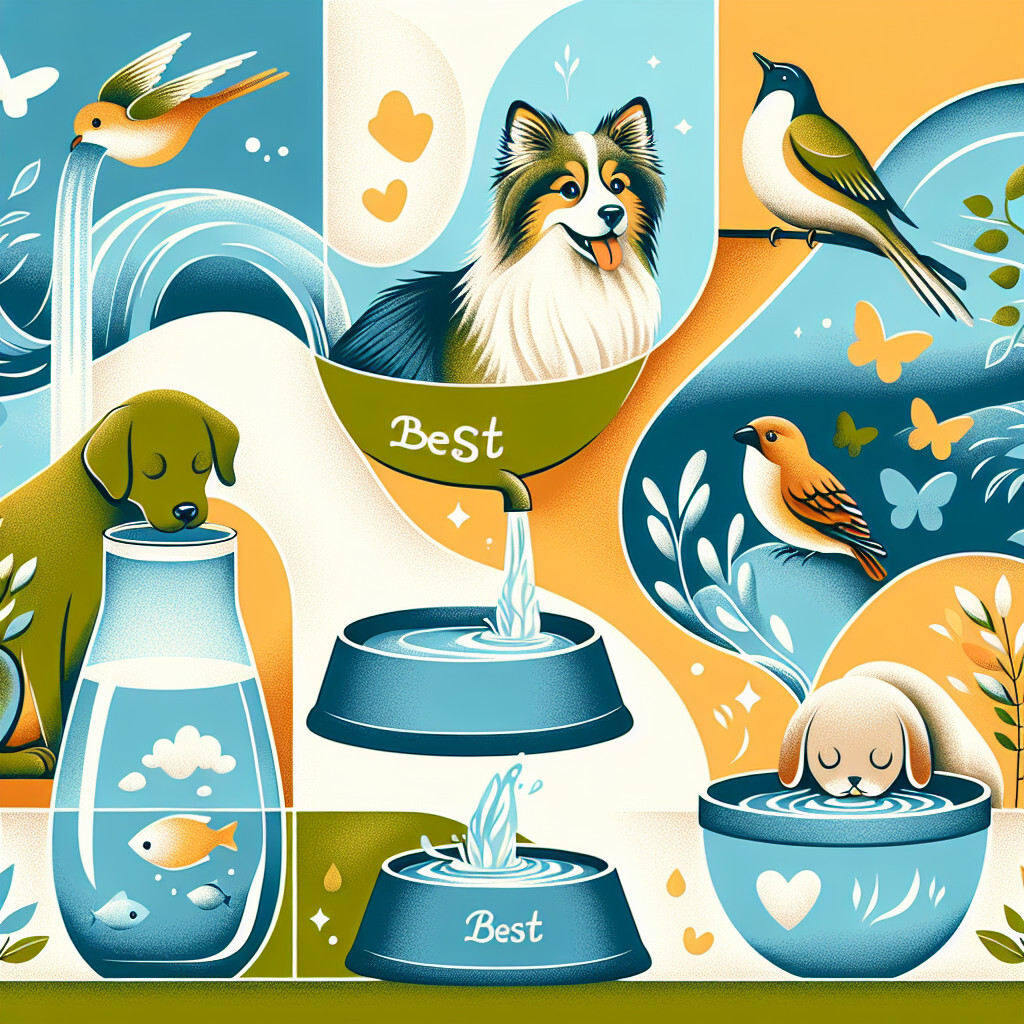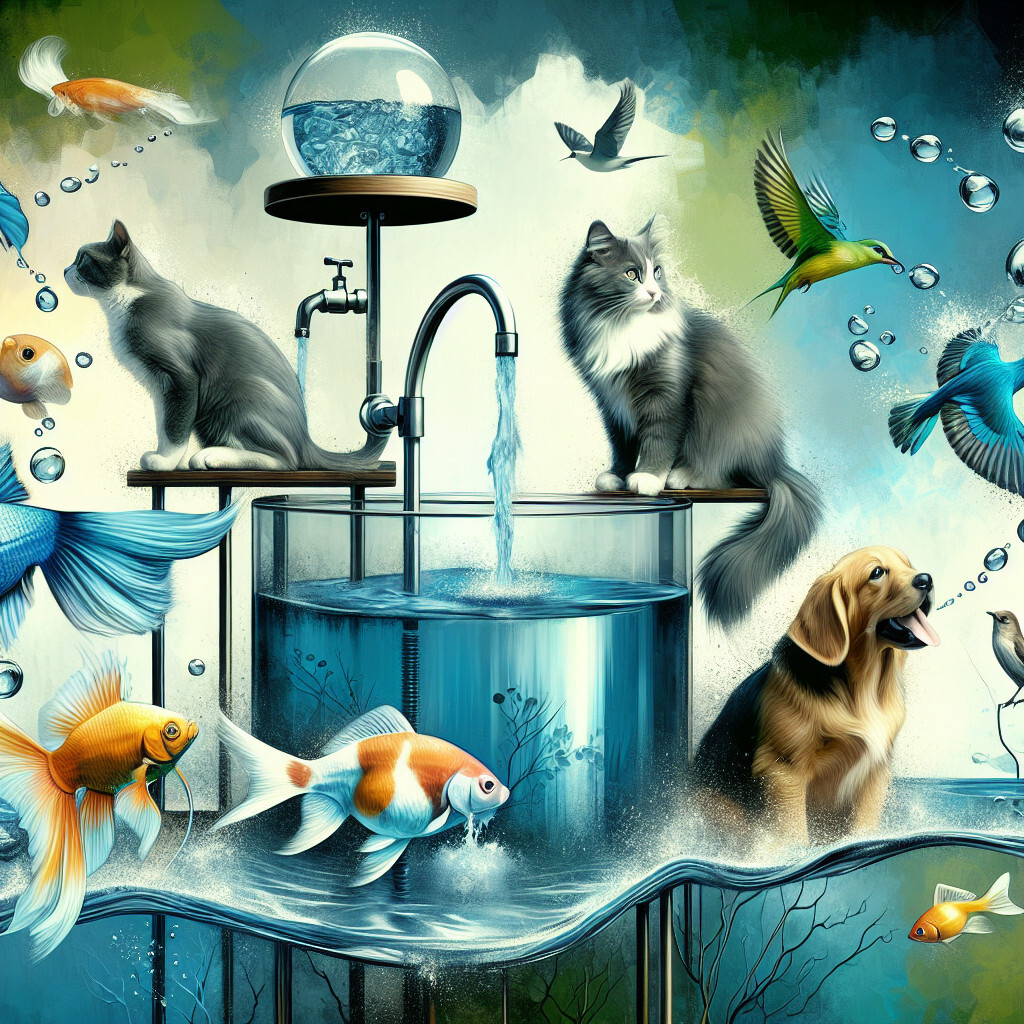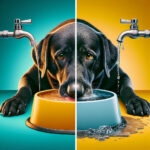-
Table of Contents
“Pure Hydration for Your Furry Friends”
Introduction

The best water for pets is clean, fresh, and free from any harmful substances. It is essential for maintaining their overall health and well-being. Pets, like humans, need water to survive and thrive. The quality of water can significantly impact their digestion, nutrient absorption, and even their skin and coat health. Therefore, it is crucial to ensure that the water provided to pets is safe, uncontaminated, and refreshed regularly.
Exploring the Best Water Types for Your Pets
Water is a fundamental necessity for all living beings, including our beloved pets. It plays a crucial role in maintaining their overall health, aiding in digestion, nutrient absorption, and temperature regulation. However, not all water is created equal. The quality and type of water we provide to our pets can significantly impact their well-being.
Tap water is the most common type of water provided to pets. It is readily available and cost-effective. However, it may contain chemicals like chlorine and fluoride, which, while safe for human consumption in regulated amounts, may not be ideal for pets. These chemicals can cause gastrointestinal upset in some animals, and long-term exposure may lead to more serious health issues.
Bottled water is another option pet owners often consider. It is typically free from harmful chemicals and contaminants found in tap water. However, it’s important to note that not all bottled water is the same. Some brands may contain high levels of sodium, which is not suitable for pets, especially those with heart or kidney conditions. Therefore, it’s essential to read the label and choose a brand with low sodium content.
Spring water is a popular choice among pet owners due to its natural filtration process. It is sourced from natural springs and undergoes minimal treatment, preserving its natural minerals beneficial for pets’ health. However, it’s crucial to ensure that the spring water is sourced from a reputable company to avoid potential contamination.
Distilled water is another option that some pet owners prefer. It is water that has been boiled into vapor and condensed back into liquid in a separate container, removing impurities and minerals. While it is the purest form of water, it lacks the essential minerals found in other water types. Therefore, if you choose to give your pet distilled water, make sure they are receiving adequate minerals from their diet.
Filtered water, on the other hand, is a great middle-ground option. It involves passing water through a device that removes impurities and potentially harmful substances. This process retains the beneficial minerals while ensuring the water is safe for your pet to drink. There are various types of water filters available in the market, from pitcher filters to more advanced reverse osmosis systems.
Lastly, there’s the option of veterinary oral hydration solutions. These are specially formulated liquids designed to keep pets hydrated, especially those recovering from illness or surgery. They contain water and electrolytes, helping replenish fluids and maintain electrolyte balance. However, these should not replace regular water and should only be used under veterinary guidance.
In conclusion, the best water for your pet largely depends on their specific needs and your personal preferences. Regardless of the type of water you choose, it’s essential to ensure it is clean and safe. Regularly clean your pet’s water bowl to prevent bacterial growth and replace the water at least once a day. Always consult with your vet if you have concerns about your pet’s hydration or if you’re considering making significant changes to their diet. Remember, providing your pet with adequate, high-quality water is a simple yet effective way to contribute to their overall health and longevity.
Understanding the Importance of Hydration: Top Water Choices for Pets
Understanding the importance of hydration for pets is crucial for their overall health and well-being. Just like humans, pets need a sufficient amount of water to maintain their bodily functions and to prevent dehydration. However, not all water is created equal, and the type of water you provide to your pets can significantly impact their health.
Firstly, tap water is the most common type of water given to pets. It is convenient and readily available. However, it may contain chemicals like chlorine and fluoride, which are added during the water treatment process. While these chemicals are generally safe for human consumption, they may not be ideal for pets, especially those with sensitive stomachs. Moreover, tap water can also contain heavy metals and other contaminants depending on the quality of your local water supply.
Bottled water is another option for pet owners. It is often filtered or purified, removing many of the potential contaminants found in tap water. However, it’s important to note that not all bottled water is the same. Some brands may still contain chemicals or minerals that could be harmful to pets in large quantities. Therefore, it’s essential to read the label and understand what’s in the bottled water you’re providing to your pets.
Spring water is a popular choice for many pet owners. It is naturally filtered as it flows through the ground, picking up beneficial minerals along the way. These minerals can contribute to your pet’s nutritional needs. However, just like bottled water, not all spring water is the same. Some sources may be contaminated with bacteria or other harmful substances, so it’s crucial to ensure the spring water you’re using is from a reliable source.
Distilled water is another option. It is boiled and then condensed back into a liquid, removing most, if not all, of its impurities. While this makes distilled water one of the purest forms of water, it also means it lacks the beneficial minerals found in other types of water. This lack of minerals can potentially lead to nutritional deficiencies if distilled water is the only type of water your pet consumes.
Lastly, there’s filtered water. This type of water has been passed through a filter to remove impurities. The type and quality of the filter will determine what substances are removed. High-quality filters can remove chemicals, heavy metals, and even bacteria, making filtered water a safe and healthy choice for pets.
In conclusion, the best water for pets largely depends on the quality of your local water supply and your pet’s specific needs. If your tap water is of high quality, it may be perfectly fine for your pets. However, if you have concerns about your tap water, consider alternatives like bottled, spring, filtered, or distilled water. Regardless of the type of water you choose, ensuring your pets have access to fresh, clean water at all times is the most important factor in keeping them hydrated and healthy.
Filtered vs. Tap Water: What’s Best for Your Furry Friends?
Water is an essential element for all living beings, including our beloved pets. The quality of water we provide to our furry friends can significantly impact their health and well-being. The debate between filtered and tap water for pets is a topic of interest for many pet owners. This article aims to shed light on this subject, providing insights to help you make an informed decision.
Tap water is the most common type of water provided to pets. It’s readily available and cost-effective. However, the quality of tap water can vary greatly depending on the location and the local water treatment process. While most tap water in developed countries is safe for human consumption, it may contain traces of chemicals such as chlorine, fluoride, and heavy metals, which are used to treat and purify the water. These substances, although present in minimal amounts, can potentially harm your pet’s health over time. For instance, excessive fluoride can lead to dental problems in dogs, while chlorine can cause eye and skin irritation.
On the other hand, filtered water is often considered a safer option for pets. Water filters are designed to remove or significantly reduce the presence of harmful substances found in tap water. They can eliminate chlorine, heavy metals, and other contaminants, providing cleaner and healthier water for your pets. Moreover, filtered water often tastes better than tap water, which can encourage your pets to drink more and stay hydrated.
However, it’s important to note that not all water filters are created equal. Some may only remove certain types of contaminants, while others can strip the water of beneficial minerals. Therefore, it’s crucial to choose a high-quality water filter that can effectively remove harmful substances without eliminating the essential minerals.
While filtered water seems to be the superior choice, it’s worth mentioning that it comes with a higher cost. Water filters require an initial investment and ongoing maintenance, which can add up over time. On the contrary, tap water is virtually free. Therefore, pet owners need to weigh the potential health benefits of filtered water against its cost.
In conclusion, both tap and filtered water have their pros and cons. Tap water is convenient and economical, but its quality can be questionable. Filtered water, while more expensive, can provide cleaner and healthier water for your pets. Ultimately, the decision depends on your personal circumstances, including your budget, the quality of your local tap water, and your pet’s specific health needs.
It’s always a good idea to consult with a veterinarian if you have concerns about your pet’s water intake or overall health. They can provide professional advice tailored to your pet’s individual needs. Remember, providing clean and safe water is just one aspect of pet care. A balanced diet, regular exercise, and routine veterinary check-ups are equally important in ensuring your furry friends’ health and happiness.
The Role of Water Quality in Your Pet’s Health: A Comprehensive Guide
Water is a fundamental component of life, and its quality plays a pivotal role in the health and well-being of our pets. Just as humans need clean, safe water to thrive, so do our furry companions. The quality of water your pet consumes can significantly impact their overall health, affecting everything from their digestion to their skin and coat condition. This article provides a comprehensive guide on the importance of water quality in your pet’s health.
Water is essential for all bodily functions in pets, including digestion, absorption, circulation, and excretion. It aids in the transportation of nutrients to cells, helps maintain body temperature, and serves as a lubricant in joints. However, the benefits of water can only be fully realized when it is of good quality. Poor quality water, laden with contaminants, can lead to a host of health issues in pets, ranging from minor ailments like gastrointestinal upset to severe conditions such as kidney damage.
One of the most common contaminants found in water is lead, which can cause serious health problems in pets if ingested over a long period. Lead poisoning can result in anemia, gastrointestinal issues, and in severe cases, seizures or death. Similarly, high levels of chlorine, often used to treat municipal water, can cause skin and eye irritation in pets, and long-term exposure can lead to more serious health issues.
Another concern is the presence of bacteria and parasites in water. Giardia and Leptospira are two common waterborne pathogens that can cause severe illness in pets. Giardia can lead to diarrhea, vomiting, and weight loss, while Leptospira can cause kidney damage, liver failure, and even death.
To ensure the water your pet consumes is safe, consider investing in a water purification system. These systems can remove harmful contaminants, ensuring your pet has access to clean, safe water at all times. Alternatively, bottled water can be a good option, but it’s important to check the source and ensure it’s free from harmful contaminants.
However, it’s not just about the water your pet drinks. The quality of water used for bathing your pet is equally important. Hard water, which contains high levels of minerals like calcium and magnesium, can cause skin irritation and negatively affect your pet’s coat. Using a water softener can help mitigate these effects.
In conclusion, the quality of water your pet consumes and comes into contact with plays a crucial role in their overall health. By providing clean, safe water for drinking and bathing, you can help prevent a host of health issues and ensure your pet lives a long, healthy life. Remember, your pet’s health is in your hands, and providing them with the best quality water is one of the most effective ways to safeguard their well-being.
Q&A
1. Question: What is the best type of water to give pets?
Answer: The best type of water to give pets is clean, fresh, and filtered tap water.
2. Question: Is it safe to give pets distilled water?
Answer: While it’s not harmful, distilled water doesn’t provide pets with the essential minerals found in regular tap or bottled water.
3. Question: Can pets drink softened water?
Answer: Softened water contains higher sodium levels, which may not be suitable for pets with heart or kidney conditions. It’s best to provide them with unsoftened tap water.
4. Question: How often should I change my pet’s water?
Answer: It’s recommended to change your pet’s water at least once a day to ensure it’s fresh and clean.
Conclusion
In conclusion, the best water for pets is fresh, clean, and filtered tap water. It should be free from any harmful chemicals or contaminants to ensure the health and well-being of the pet. Bottled or distilled water can also be used but it’s not necessary unless recommended by a vet for specific health conditions. Regularly changing the water and cleaning the pet’s water dish is also crucial to prevent the growth of bacteria and algae.






